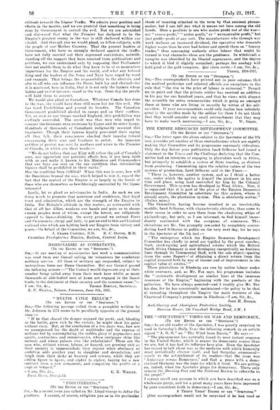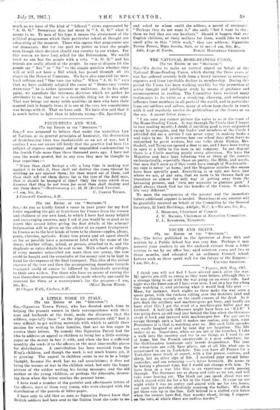THE " SPECTATOR'S " VIEWS ON WAR AND DEMOCRACY. [To
rue EDITOR or THE " SPECTATOR."' Sru,—As an old reader of the Spectator, I was greatly surprised to reed in Saturday's Daily News the following remark in an article signed " A. G. G." on " The Wind from Russia." He says :— " The phenomenon has naturally found its most instant response in the United States, which is nearer its demosratic source than we are, but it has had its influence here also. Even the Spectator has ceased to talk about was as the medicine with which humanity mast periodically cleanse itself, and last Saturday announced— sorely to the astonishment of its readers—that the issue was Autocracy versus Democracy,' and that a petite with a demo- cratised Germany was the hope for which it lived. We are getting on, indeed, when the Spectator prays for democracy. There only remain the Morning Post and the National Beview to subscribe to the gospel."
I cannot recall any passage in which yen have described war as a wholesome purge, and for a great many years have been impressed by your consistent faith in democracy.—I am, Sir, am.,
much as we bare of the kind of " Liberal" views represented by "A. G. G." Democracy does not mean to A. G. G." what it means to us. To men of his type it means the attainment of the political programme which their particular school of thought are advocating at the moment. Those who oppose that programme are not democrats. But for our part we prefer to trust the people even though their decision should rem counter to our wishes. For this reason lee have long asked for the Referendum. We would trust no one but the people with a veto. "A. G. G." and his friends are really afraid of the people. In ease of dispute let the people say " see" or "No" M the simple question whether they will or will net have a Bill which has passed through all its stages in the House of Commove. We have also appealed for man- hood suffrage and "One vole one valise." When " A. G. G." says that we have suddenly adopted the cause of "Democracy reran Auto: racy " he is either ignorant or malicious. As to his other point, we repudiate the infamous doctrine which we gather lie attributes to us, that war is is desirable thing for its own sake. That war brings cut many noble qualities in men who hare their quarrel just is happily true; it is one of the very few consolations war brings with it. That see hare said. We have also said that it is mach better to fight than to tolerate wrong—Ea. Spectator.]



























 Previous page
Previous page